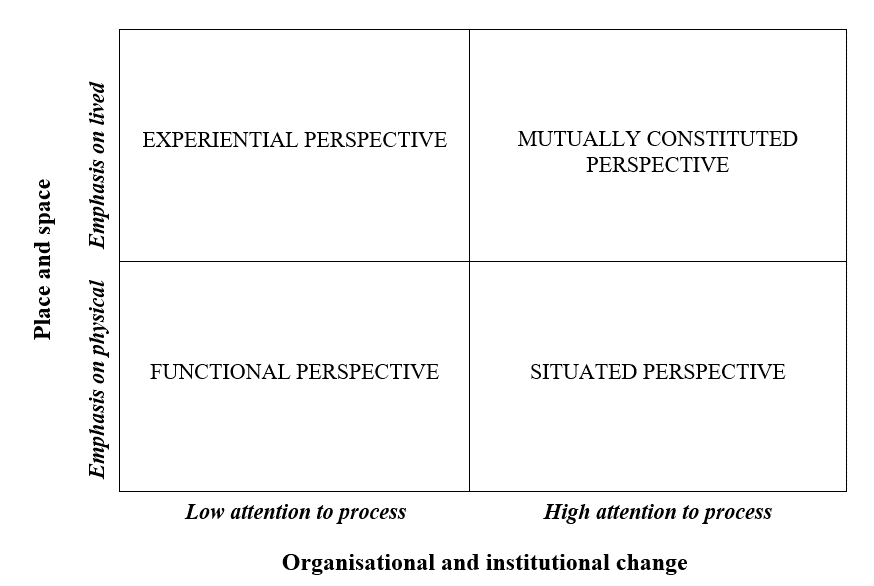
As researchers who are interested in how organisations and institutions change, recent events drew our attention to the role of place and space in shaping these changes. Climate change-induced flooding, heatwaves, wildfires and droughts altered local landscapes in ways that drove emergency service organisations to repurpose buildings as emergency shelters and businesses to permanently relocate. The COVID-19 pandemic led organisations to reimagine the meaning of the office and to revise the relationship between buildings, indoor air and health. Advances in digital technology and artificial intelligence (AI) facilitated surveillance of workers at a distance and allowed domestic homes to be repurposed as hotels. These events made us curious about the way that change is connected to place and space. We knew that other management researchers were also interested in these relationships but had typically focused on how and when change happens rather than where.
We decided to investigate what management researchers already knew about the role of place and space in organisational and institutional change. In our systematic literature review, published in the Journal of Management Studies, we identified, read, and analysed 290 articles published between 1979 and 2020 about organisational or institutional change and also place or space. Through this process, we generated four perspectives on the role of place and space in how organisations and institutions change. We called these the functional perspective, the situated perspective, the experiential perspective, and the mutually constituted perspective. These perspectives differ on high or low attention to the process of change and whether place and space are studied as physical or as a lived experience by a study’s respondents/subjects.

Four perspectives on the role of place and space in change
Functional Perspective
From a functional perspective, places and spaces are “points on a map” that influence the outcomes of organisational and institutional changes such as the adoption of a new organisational structure or the spread of an innovation. Researchers include information about geographic locations (e.g., distance between organisations, city population) or physical settings (e.g., use of surgery rooms) in their research about change. They often use numbers to test theories that expand our knowledge about change.

Situated Perspective
From a situated perspective, the process of organisational and institutional change (e.g., routines, strategy-making, actions), happens in places and spaces. Researchers view places (e.g., ‘big city’ and ‘backwater’ towns, government-regulated fishing waters, communities in regional government areas) and spaces (e.g., colocation, multi-site facilities) as part of the geographic, sociocultural, historical, economic, political and physical context of organisations and institutions. They study organisations and institutions over time to better understand change.


Experiential Perspective
From an experiential perspective, people experience place and space differently when organisations and institutions change. Researchers focus on peoples’ experiences in places and spaces during a change event, such as an office redesign, the adoption of lean management principles or the introduction of flexible work arrangements. They collect information about how people experience places (e.g., community gardens) and spaces (e.g., collaborative buildings, hospitals, retail settings) to learn more about place and space.

Mutually Constituted Perspective
From a mutually constituted perspective, organisations and institutions are changed by and also change how people experience place and space. Researchers focus on what people to do create places and spaces, and organisations and institutions at the same time (e.g. the role of neighbourhoods in social movements, how hospital emergency departments act as places of social inclusion, responses to climate change on a local and global scale). They study these processes over time to learn about the relationship between place and space, and change.

Four place and space-conscious ideas for leading change
The four perspectives explore different ways that place and space can influence change. We suggest attending to all four perspectives when leading change.
- Be mindful of how physical locations can impact change. Although digital connectivity has removed many geographic and spatial barriers to communication, global events like wars and natural disasters can still have a big impact on local resources. When engaging in change processes, be mindful of the constraints and opportunities linked to locations and settings.
- Consider the local context. Alongside physical geography, try to understand how sociocultural, historical, economic and political factors come together to influence change.
- Understand the experiences of people who use places and spaces. It is critical to consider how people perceive places and spaces when planning change. Including users in the change process can help avoid negative unintended consequences. For example, city planners aiming to revitalize city centres could lead changes in inclusive ways by consulting the historical habitants of these places (e.g. homeless-serving organisations).
- Acknowledge the connections between place and space, and change. Small changes at the local level have the potential to influence large changes on a global scale. When leading change you can help people to understand these connections.
Takeaways for researchers
Our full paper will be of interest to:
- Change researchers who want to understand place and space as key concepts influencing change. Our four perspectives offer four pathways forward which researchers can use to explore where change happens.
- Researchers interested in how places and spaces change. Our paper outlines relevant concepts, language and ideas from the organisational and institutional change literature to advance research on place and space.
- Management researchers interested in the concepts of place and space. Specialist research from fields such economic geography and sociology will help management researchers distinguish between place and space, and to understand how they are connected.
Photo by GeoJango Maps on Unsplash

0 Comments